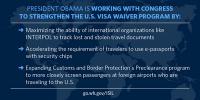-
Newspaper apologizes for saying terror links prevented U.K. Muslim family from going to Disneyland
The Mail Online, the Web site of the British newspaper Daily Mail, has issued an apology for running stories depicting a Muslim family as extremists, after family members were denied entry to the United States last year for a vacation in Disneyland. Two articles by Mail reporter Katie Hopkins suggested that Mohammed Tariq Mahmood and his brother, Mohammed Zahid Mahmood, were extremists with links to al Qaeda.The Mail Online has agreed to pay “substantial damages” totaling £150,000 to the Mahmood family. Hopkins also tweeted an apology on Monday.
-
-
U.S. will deny visas to Gambian officials for refusing to take back deported Gambians
The United States, responding to the refusal by The Gambia to accept some 2,000 Gambians the United States has been trying to deport, will deny visas to Gambian officials. DHS secretary Jeh Johnson made the decision, which is only the second time the United States used the denial of visas to force a country to accept its deported citizens (President Bush used it in 2001 against Guyana). More than twenty countries refuse to take back their citizens – with Cuba refusing to accept more than 30,000 Cubans ordered to leave the United States.
-
-
Not all Visa Waiver program nations share information with U.S. as required: GAO
The Visa Waiver Program (VWP) allows nationals from the thirty-eight VWP countries to travel to the United States for tourism or business for up to ninety days without a visa. To help prevent terrorists and others who present a threat from travelling to the United States, DHS requires VWP countries, among other things, to enter into information-sharing agreements with the United States. In a public version of a classified January 2016 report on the VWP, the GAO examines the extent to which VWP countries have implemented different agreements with the United States which VWP requires.
-
-
EU backs visa-free travel for Turkish citizens to EU zone
The European Commission has recommended visa-free travel in Europe for Turkish citizens. Turkey still has to meet some of the seventy-two conditions set by the EU. The deal must be approved by the parliaments of all of the EU twenty-eight member states before the 30 June deadline. The lifting of visa requirements for Turkey’s eighty million citizens has been a subject of intense debate among EU member states. Turkey threatened that if the EU and its member states failed to approve the visa deal, Turkey would withdrew from the refugee agreement it had reached with the EU in March.
-
-
EU cannot identify, track visa overstays
Critics of the plan to give Turkish citizen visa-free access to the EU zone say the measure could allow these travelers to disappear because the European Union does not have a system to detect visitors who overstay their visas. The critics say that the problem is compounded by plans to grant vis-free travel to the fifty-two million people from Ukraine, Kosovo, and Georgia. In normal times, visa overstays account for the majority of illegal migrants in Europe.
-
-
Candidates' plans to change controversial H-1B guest worker program highlight need for an overhaul
Since its inception in 1990, the H-1B guest worker program that allows employers to bring in high-skilled foreign workers on six-year visas has been steeped in controversy. Critics accuse it of depressing wages and outsourcing American jobs, while advocates call it an essential source of the best and brightest talent. The H-1B program is an important program that serves as a bridge to permanent immigration for talented foreign workers. It should be used to recruit truly specialized workers from abroad when the labor conditions are tight and a qualified American can’t be found. But no American worker should ever be displaced by an H-1B worker – that was never the program’s intent – and this practice should be ended.
-
-
Five European countries face removal from Visa Waiver program
DHS has told five countries – France, Belgium, Germany, Italy, and Greece – that they have until Monday, 1 February, to fix a security flaw – DHS described it as a “crucial loopholes”— in their passport stems. If they fail to do so, they will be removed from the Visa Waiver program. The move will affect millions of European citizens.
-
-
1 percent of visitors to U.S. over-stayed past 2015 exit dates

DHS said that about 1 percent of visitors who arrived in the country by air or sea remained in the country last year after they were supposed to leave. DHS release data on Tuesday which show that about 45 million of those visitors were due to leave at some point in the year ending 30 September, and that DHS could confirm that all but 416,500 had exited the country. Another 66,500 people stayed past their leave date, but later left the United States.
-
-
New regulations improve opportunities for certain highly skilled workers

DHS’ U.S. Citizenship and Immigration Services on Friday announced changes to the programs serving the H-1B1, E-3, and CW-1 nonimmigrant classifications, and the EB-1 immigrant classification. The purpose of the changes was to remove the obstacles and disadvantages workers in these categories faced compared to workers in other visa classifications.
-
-
San Bernardino mosque may be reason for barring British Muslim family from entering U.S.

Muhammad Mahmood, 47, who is a U.S. citizen and who a runs a car repair shop in San Bernardino, California, speculated that the reason his two brothers, their wives, and their children — all of them British citizens – have been barred from entering the United States to visit Disneyland was that he prays at the same mosque where one of the San Bernardino shooters, Syed Farook, used to pray.
-
-
Since 2001, U.S. has revoked 9,500 visas over terrorism threat
Since 2001, the U.S. government has revoked more than 122,000 visas – of which some 9,500 were revoked because of the threat of terrorism. The information was revealed by Michele Thoren Bond, assistant secretary for the Bureau of Consular Affairs at the Department of State. When Bond was asked about the whereabouts of the thousands of foreigners whose visa had been revoked, she admitted she did not know. Members of a House panel before which Bond was testifying pressed her on why public social media postings should not be routinely examined as part of the vetting process for those attempting to enter the United States.
-
-
U.S. officials barred from reviewing social media postings of visa applicants
Officials from DHS and the Department of State, as a general policy, do not check social media postings of applicants out of civil liberties concerns. With this policy in place, the department’s officials who handled Tashfeen Malik’s application could not have seen her pro-ISIS postings and note her growing radicalization. Officials from United States Citizenship and Immigration Services (USCIS) and U.S. Immigration and Customs Enforcement (ICE) pressed for a change in DHS policy in light of the fact that social media is increasingly used by followers of jihadist groups to declare their allegiance, but the disclosures by Edward Snowden about NSA surveillance programs was behind the reluctance of DHS high officials to change the policy for fears such a change would further damage the administration’s standing with civil rights groups and European allies.
-
-
GOP lawmakers draft bill to bolster Visa Waiver security

About twenty million people use the Visa Waiver program to come to the United States every year. A bill being considered in the House would block anyone who has traveled to Syria, Iraq or a few other nations in the past five years from participating in the Visa Waiver program. It would also require the United States to collect more information about those who avail themselves of the program, codifying a policy already in place.
-
-
U.S. modifies Visa-Waiver program to make it more secure
The United States announced Monday that it would make changes to the Visa Waiver program in an effort to prevent terrorists who are citizens of Visa Waiver countries from easily entering the United States. The New York Times reports that the White House has admitted that the changes — which would impose higher fines for airlines which fail to verify passengers’ identities and increased information-sharing among countries — are limited, and that more sweeping changes would require Congressional action. Law enforcement and security experts say that the Visa Waiver program — which allows more than twenty million foreigners form the thirty-eight Visa Waiver countries to travel to the United States each year without being interviewed at American consulates and embassies — dwarfs the administration’s Syrian refugee plan, and poses a far greater threat to national security.
-
-
Visa Waiver program more serious threat than refugees: Senate Intel. Comm. chair
Senator Richard Burr (R-North Carolina), chairman of the Senate intelligence committee, said that terrorists who are citizens of Visa Waiver countries – and who, therefore, can travel from Europe to the United States without a visa — pose a more serious threat to U.S. security than refugees from Syria. Senator Dianne Feinstein (D-California), vice-chairman of the intelligence committee, said that around 13 million people enter the United States each year through the Visa Waiver program, but she also understands that more than 40 million stolen travel documents are on the black market in Europe.
-
- All
- Regional
- Water
- Biometrics
- Borders/Immig
- Business
- Cybersecurity
- Detection
- Disasters
- Government
- Infrastructure
- International
- Public health
- Public Safety
- Communication interoperabillity
- Emergency services
- Emergency medical services
- Fire
- First response
- IEDs
- Law Enforcement
- Law Enforcement Technology
- Military technology
- Nonlethal weapons
- Nuclear weapons
- Personal protection equipment
- Police
- Notification /alert systems
- Situational awareness
- Weapons systems
- Sci-Tech
- Sector Reports
- Surveillance
- Transportation
Advertising & Marketing: advertise@newswirepubs.com
Editorial: editor@newswirepubs.com
General: info@newswirepubs.com
2010-2011 © News Wire Publications, LLC News Wire Publications, LLC
220 Old Country Road | Suite 200 | Mineola | New York | 11501
Permissions and Policies
Editorial: editor@newswirepubs.com
General: info@newswirepubs.com
2010-2011 © News Wire Publications, LLC News Wire Publications, LLC
220 Old Country Road | Suite 200 | Mineola | New York | 11501
Permissions and Policies
